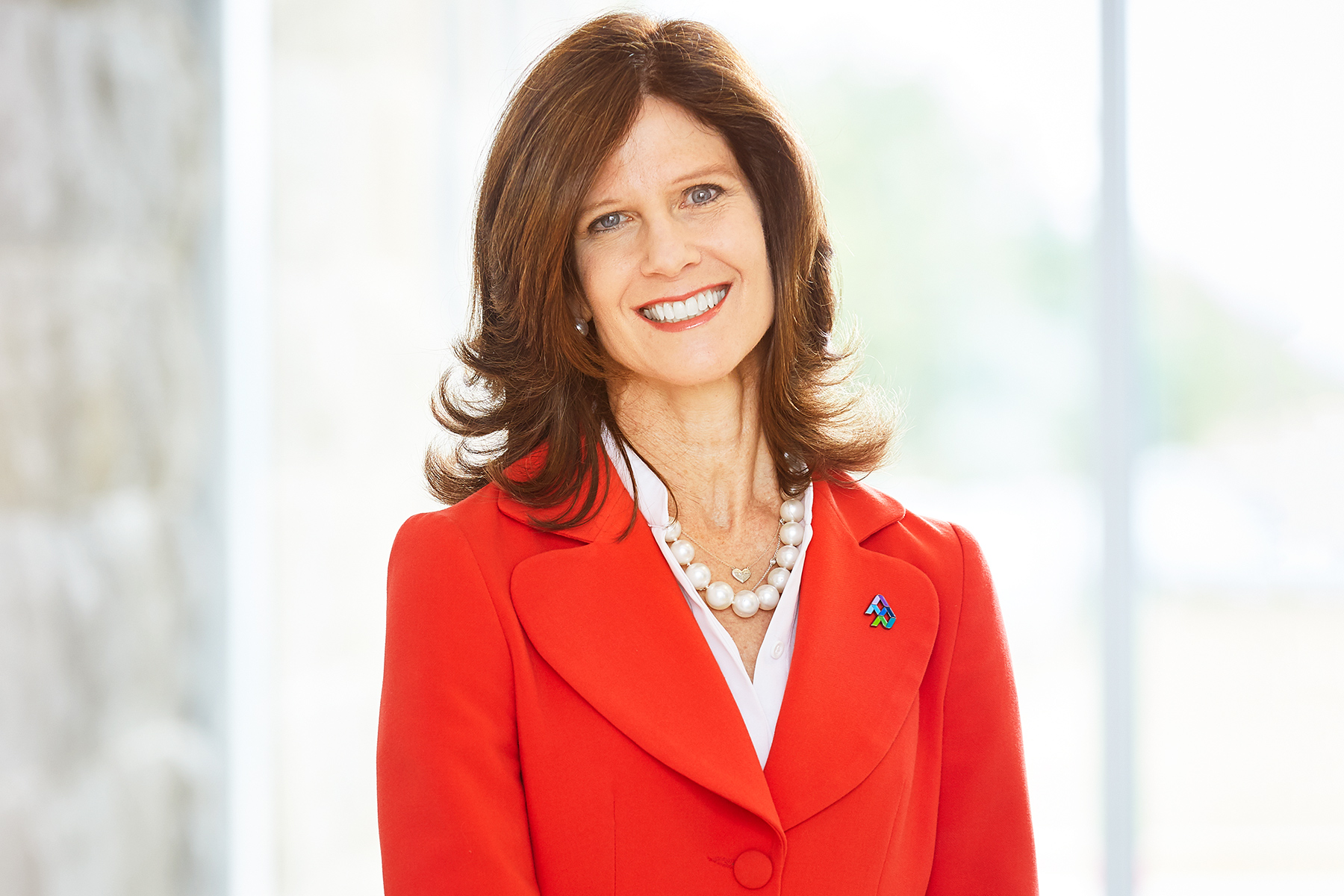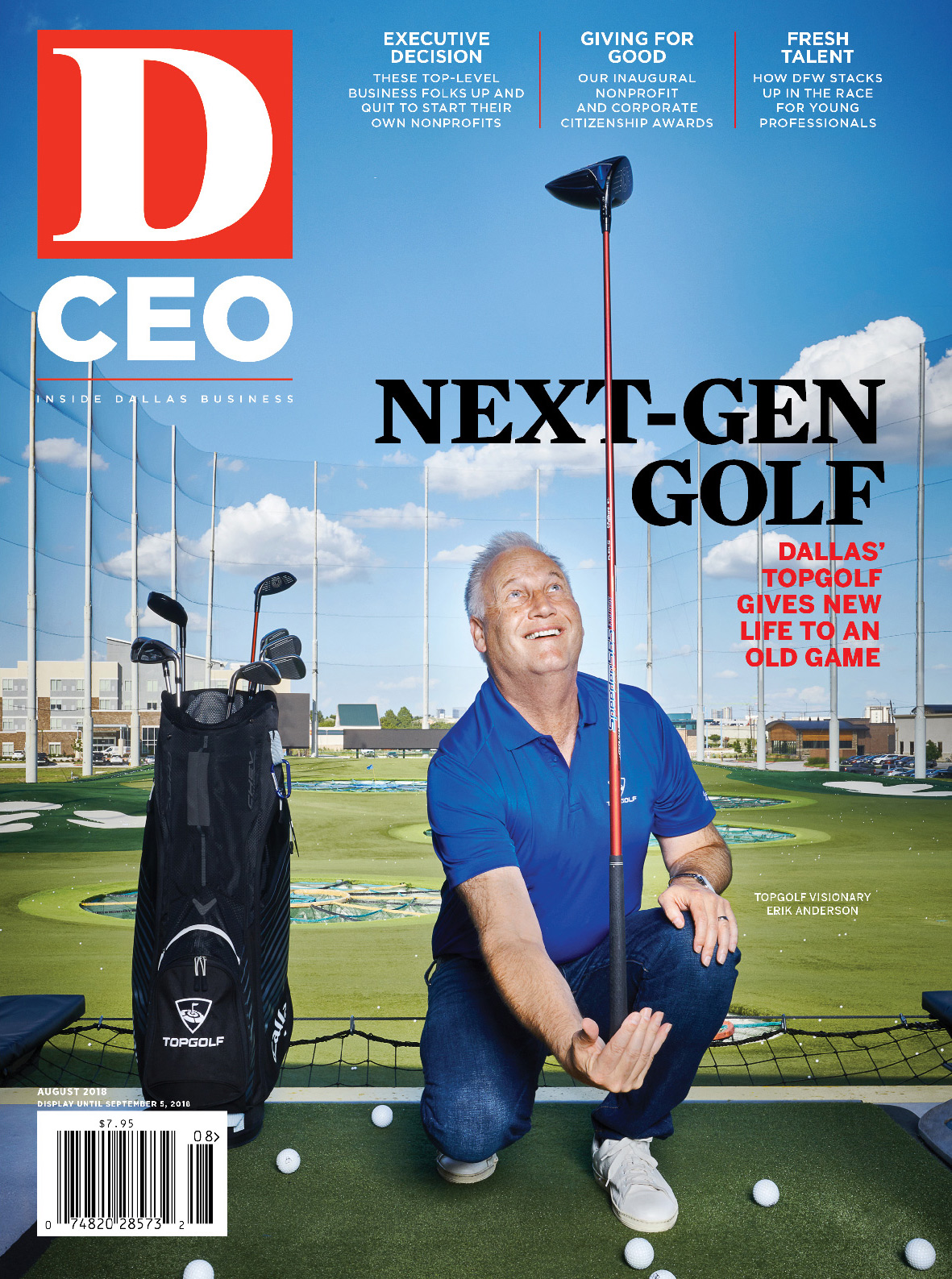Why you need to know her: Because she heads a $2 billion-plus (revenue) company that is the largest healthcare staffing firm in the country and is growing rapidly, due in part to nationwide nursing and physician shortages. And also because she herself moved to Dallas-Fort Worth from San Diego in September, creating what AMN Healthcare calls a “second” headquarters here, with plans to target the bulk of the company’s future growth in North Texas. AMN now boasts 700 employees at its offices in Cypress Waters, versus 1,100 in California. And because when she made that move, she became the latest member of an exclusive club: one of just a handful of women atop the largest 150 public companies in North Texas.
Piercing the predominately male C-suite as a female, however, was not the first apparent barrier turned non-issue by Susan Salka, a Nebraskan raised in the type of tiny Midwestern town you don’t usually leave. “Growing up there, an aspiration was to have a double-wide trailer rather than a single-wide,” she says. “To go to college meant you had to start saving up pretty early.” Salka attended Chadron State College in Chadron, Nebraska, studying accounting and economics. About a year after graduation, she picked up and headed west for San Diego, landing a gig at a biotech company that was in the midst of being acquired. There, she worked hard and raised her hand often, making enough of an impression on the CFO to warrant his invitation to join a new venture capital firm he and the company’s CEO were starting.
Salka, 24 at the time, was earning $31,000 annually, which met her 30K-by-age-30 goal, but didn’t leave enough money to throw in the $1,200 stock investment the new VC firm offered. The new firm loaned her the cash for it anyway. In a remarkable run, five of the six biotech companies in which the new firm invested would either be bought or go public (among them were Pyxis Corp., Amylin Pharmaceuticals, and Biosite Diagnostics). Along the way, Salka felt her way through makeshift CFO roles, thrust into figuring out things like lease negotiations and research and development contracts. Recalls Salka: “I would honestly say, ‘Tim, I don’t know how to do this,’ and he’d say, ‘You’re smart, you’ll figure it out. And I’ll be here as a safety net.’” The years were formative. In addition to what became a very nice chunk of savings, Salka took with her lessons about how to find and nurture talent.
“We’re going to have less and less nurses in the country as nurses age, because you have a bottleneck on the front end,” she says.
As the guys were deciding not to raise a second fund, Salka was approached by a boring-sounding, five-year-old company in the same building. It needed a VP of finance. It had just 18 employees, operated in the newish field of travel nurse staffing, and was called American Mobile Nursing—AMN. In 1990, Salka came aboard.
Where she anticipated monotony, Salka found vast opportunity, and she climbed the ranks, even after taking a step back for a time to start a family. She became CEO in 2005, when AMN board member and prominent DFW investor Doug Wheat rallied the board to vault Salka into the position. (Steven Francis, the company’s founder and then-CEO, became chairman of the board.) “She’s really good for the culture,” says Wheat, who took over as chairman for Francis in 2008 and remains in the role today. “People buy into her culture. She gets done what needs to be done without being a mean person, raising her voice, anything like that.” Wheat, whose background is in private equity, is effusive with his praise: “Susan is by far the best CEO I’ve ever worked with.”
AMN made a key M&A move in the mid-2000s, acquiring Dallas-based Merritt Hawkins and sister company Staff Care in a deal worth nearly $200 million. AMN continues to run an active M&A shop. In April, the company closed on the $195 million acquisition of Florida-based MedPartners, plus another $20 million reliant on performance. “On more than one occasion, we were competing with someone else, and I think the reason we were able to buy the company was Susan’s personality,” Wheat says.
In addition, hospital systems have increasingly had to look to companies like AMN to help fill staffing gaps. In 2014, AMN’s revenue came in at $1.04 billion. By 2016, it was up to $1.9 billion. In a testament to the nursing and physician shortages, AMN registered organic growth of 26 percent and 17 percent, respectively, during those two years. Last year wasn’t quite as explosive, but Salka says the business is still fundamentally the same, and shortages persist. “We’re going to have less and less nurses in the country as nurses age, because you have a bottleneck on the front end,” she says, meaning the educational system.
But Salka sees AMN—which today does all kinds of nursing and physician and hospital personnel staffing, including leadership—evolving toward helping hospital systems optimize their own workforces, using things like predictive analytics. Salka setting the industry’s direction would not surprise Richard Wahlquist, president and CEO of the American Staffing Association. He says AMN grasped early on that the rapidly evolving healthcare industry would want a one-stop shop for talent and workforce help. “I consider Susan to be a true staffing industry visionary,” he says.







